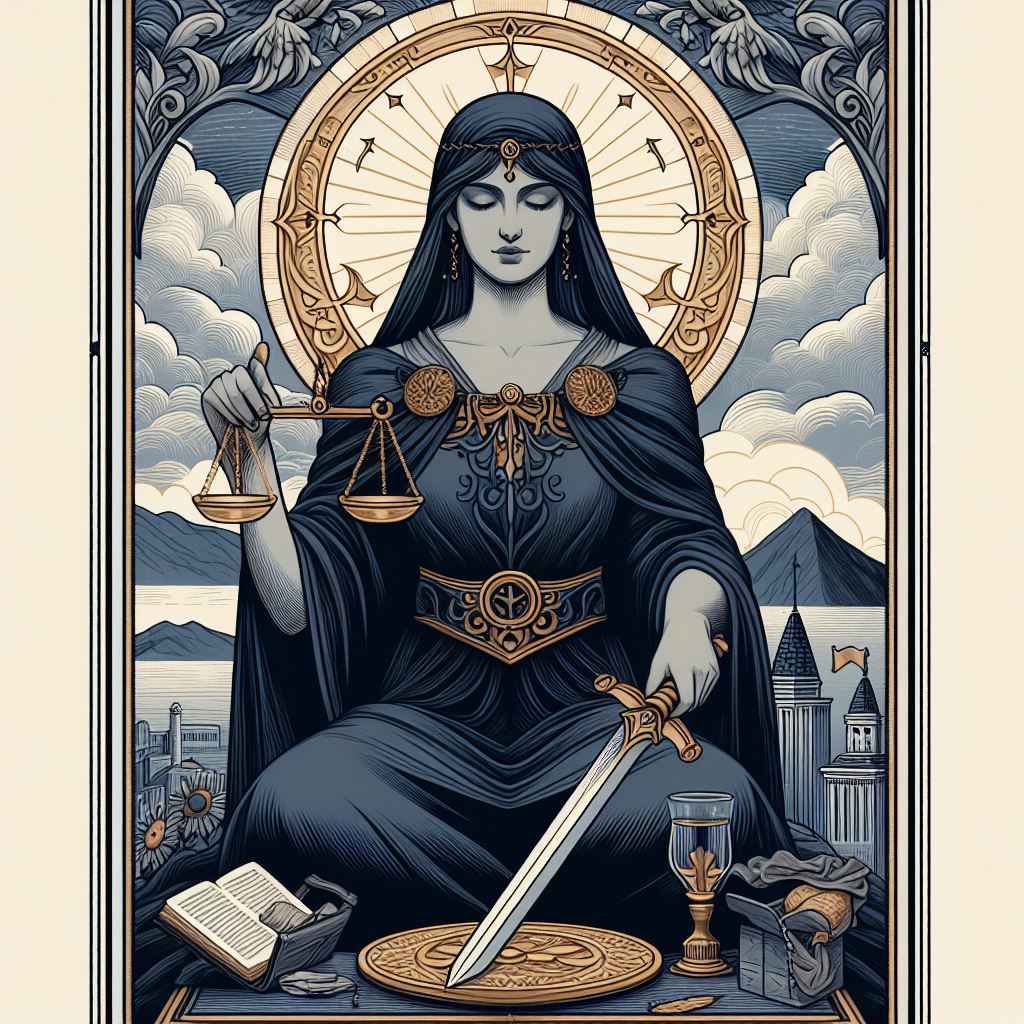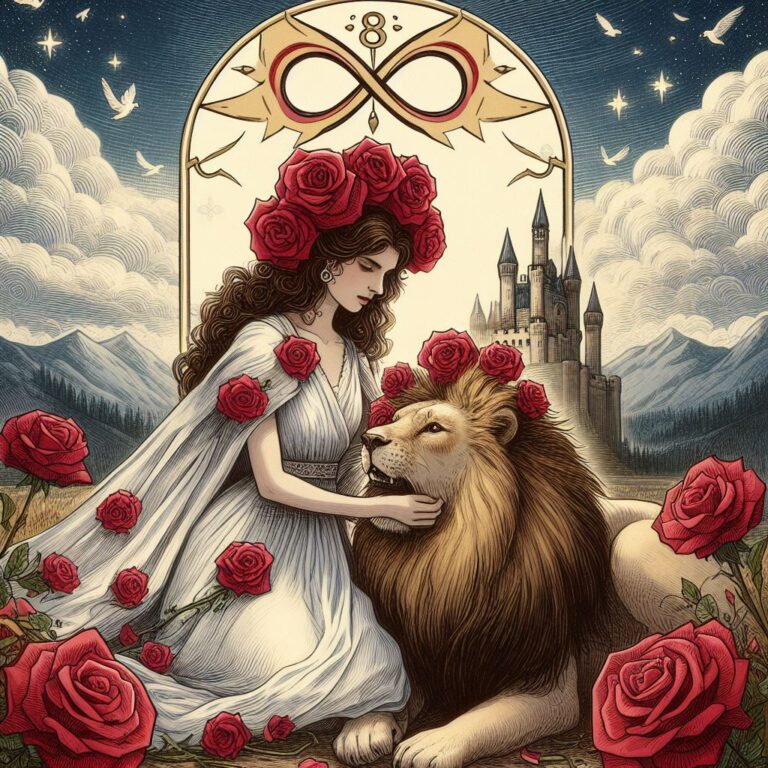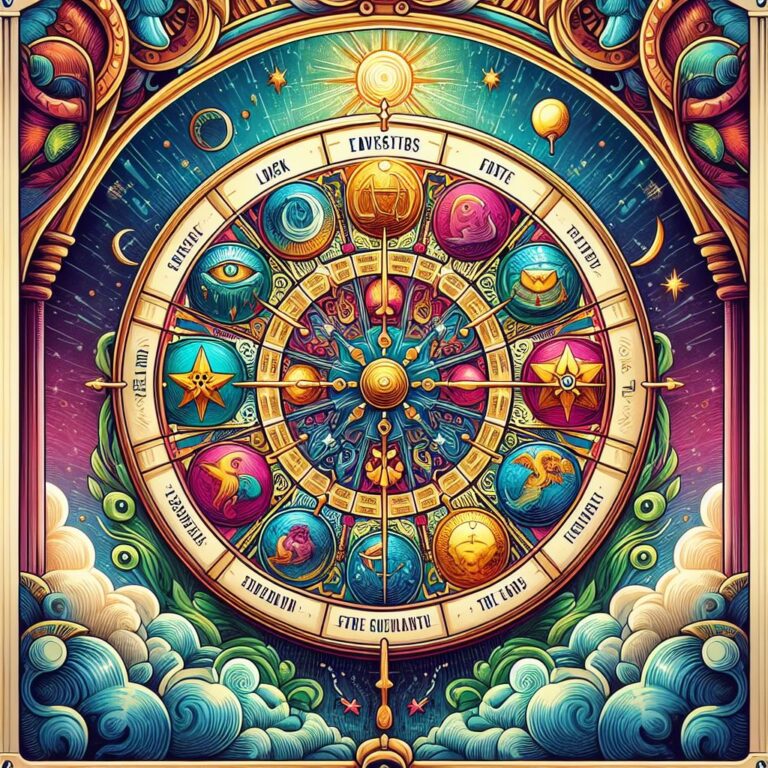Justice as feelings in love and relationships – Upright and Reversed – A Guide to Balance
Introduction
The Justice tarot card often comes up in readings involving relationships and feelings. As one of the Major Arcana cards, Justice has profound meaning when it appears, indicating a major life lesson regarding balance, truth, and cause and effect.
Upright, Justice encourages us to align with cosmic law – to weigh situations fairly, act ethically, and speak our truth. Reversed, Justice cautions that we may be slipping into victimhood, blaming, or avoidance of responsibility. Both orientations offer guidance on restoring equilibrium in times of upheaval.
By exploring Justice in the context of relationships, we can uncover where we need more balance and accountability. We can discover how to healthily process feelings, establish boundaries, and communicate openly. Justice reminds us that with willingness and wisdom, we can create partnerships rooted in equality, compassion, and mutual growth.
Upright Justice in Love and Relationships

When upright, the Justice card brings a stabilizing, clarifying energy to relationships. It signifies a time of clear perspective in which we can assess the truth of a situation to determine what needs to shift.
Fairness and Equality
In romance, Justice often signals that a significant decision or conversation is at hand regarding the future of the bond. Upright, it reminds us to step back and evaluate whether the relationship is balanced and serving both partners equally.
We must ask ourselves challenging questions. Do I feel respected, heard, and cared for? Am I giving as much as I’m getting from this relationship? Is my partner putting in equal effort? If the answer is no, Justice gives us the courage and discernment to re-establish equilibrium.
Honest Communication
Justice encourages direct but thoughtful expression of grievances to get a relationship back on track. With patience and compassion, we can lovingly communicate where we feel hurt, unseen, taken for granted, or unhappy. This forthrightness allows our partners the chance to respond accordingly and restore balance through compromise.
Personal Accountability
When Justice appears, we must also reflect on our own behavior and shortcomings. Where have we fallen out of integrity and let a relationship go awry? Have we been passive, controlling, negligent, or untrustworthy? Justice reminds us to own our missteps, make amends, and do better. Taking personal accountability is key to balancing the scales.
Reaping What’s Sown
Justice indicates we’re entering a period where our past actions bear fruit. If we’ve acted with integrity, our commitments and values will be mirrored back to us in enduring, supportive partnerships. But if we’ve overextended, betrayed trust, or behaved selfishly, the results may be painful.
Either way, Justice confirms that we draw to us relationships that align with who we are and how we conduct ourselves. Our outer world reflects our inner world. With clear eyes, we can see where we must shift to plant seeds for more nourishing connections down the road.
Reversed Justice in Love and Relationships
When Justice appears reversed, relationships and feelings may be out of sync. Imbalances have set in and we’ve lost sight of what’s fair and true. Reversed Justice cautions against the pitfalls of victimhood, denial, and blaming others. It’s a call to get radically honest with ourselves.
Denial and Projection
Reversed, Justice warns that we may be avoiding responsibility in a relationship and instead pinning blame elsewhere. Do we always fault our partner as the problem? Do we refuse to acknowledge our own destructive patterns? Reversed Justice encourages us to get brutally honest. Wherever we feel victimized, we must look deeper to uncover our participation. Until we shift the finger pointing, relationships will remain off-kilter.
Repressed Feelings
Justice reversed can also indicate emotions building beneath the surface, threatening equilibrium. Are we burying anger or sadness to “keep the peace”? Do we smile and say “I’m fine” when we’re actually unhappy? Suppressed feelings won’t vanish. They’ll curdle and eventually explode, rocking a relationship’s foundation. Justice urges us to process and communicate feelings in healthy ways before they destabilize things.
Loss of Shared Values
Reversed, Justice suggests core values are no longer mutually honored, creating distance. Do fundamental differences in ethics, politics, lifestyles, or priorities now erode intimacy? Reversed Justice reflects relationships losing center as partners follow diverging paths. We must determine whether compromise is possible or if the gulf has grown too wide. Either way, authenticity and self-care are essential.
Breakdown of Trust
When reversed, Justice can indicate betrayal and the painful aftermath – the scales of relationship reciprocity decimated by lies, infidelity, or broken vows. Rebuilding stability requires total honesty, accountability, and a commitment to earn back trust slowly, through changed behavior over time. Even still, some damage can’t be undone, requiring us to walk away with wisdom learned.
Conclusion
The Justice card carries essential teachings about maintaining equilibrium – in life and relationships. Upright Justice reminds us that what we give, we’ll receive. It encourages honest communication, boundaries, and taking personal responsibility when relationships lose balance. Reversed, Justice is a wake-up call to get out of denial, process repressed emotions, and come back into integrity. In relationships and feelings, this iconic tarot card keeps us aligned with truth, fairness, and the universal laws that govern harmony.






